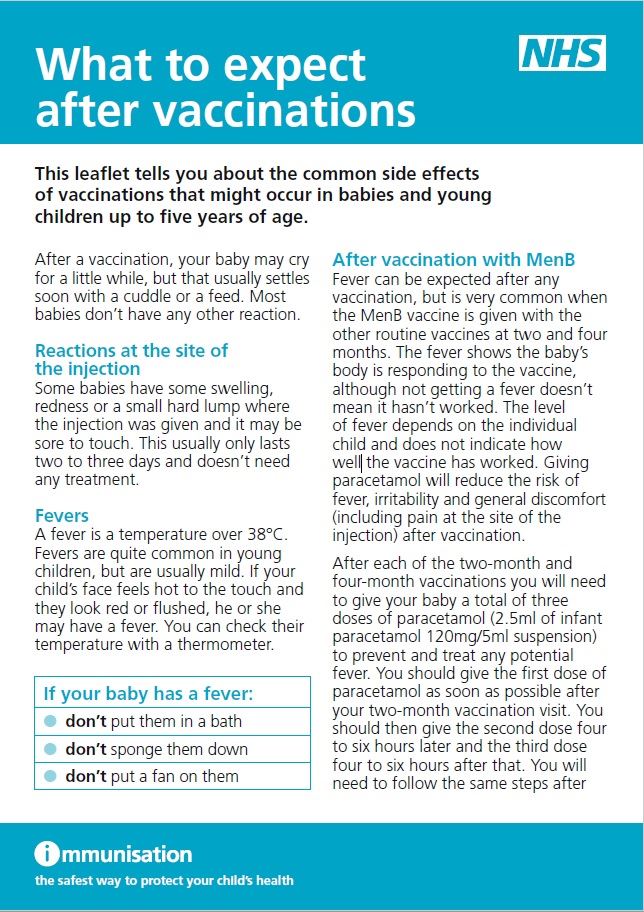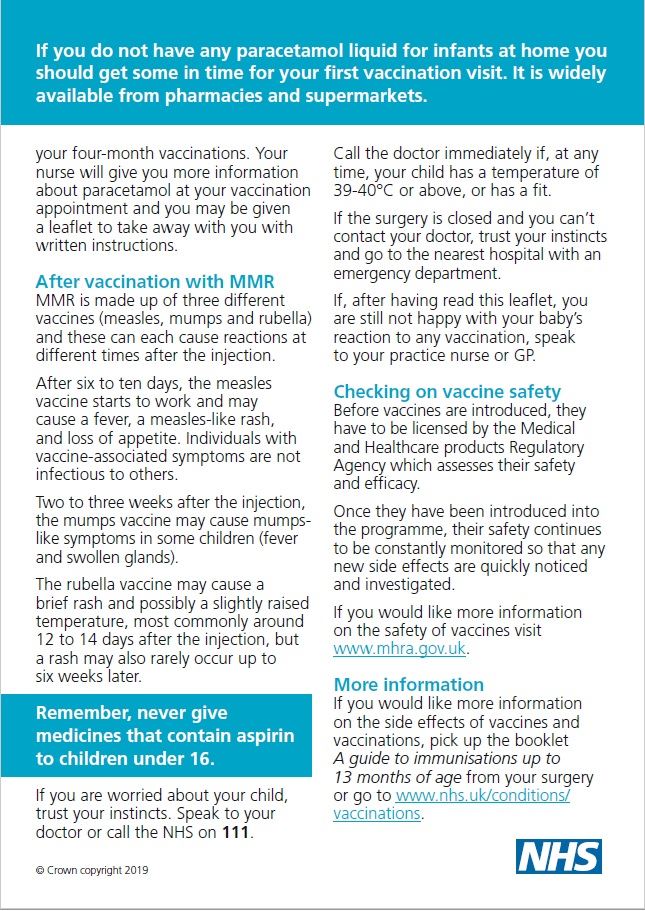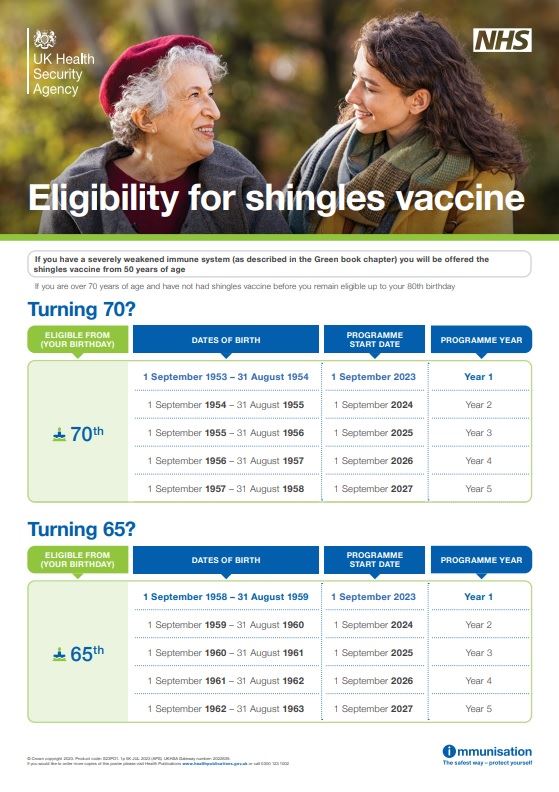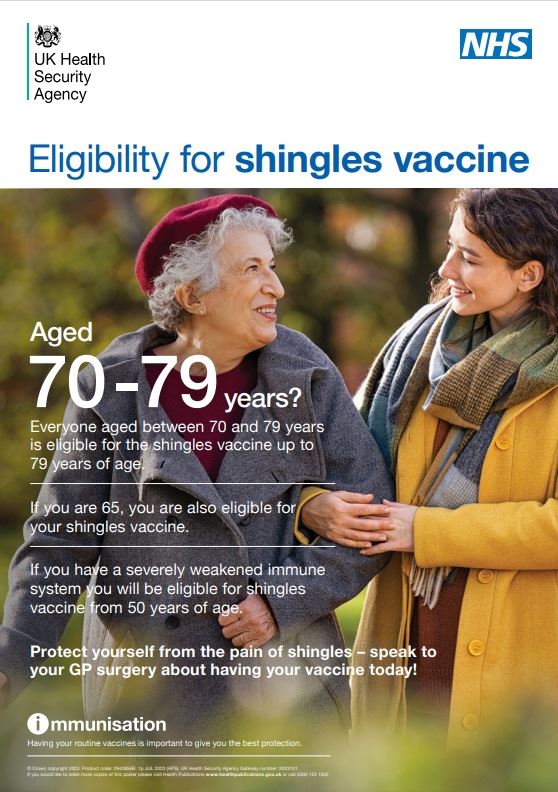Immunisations
Child Immunisations
This section of the website includes all the information you require regarding your child’s immunisations.
- What to expect when bringing your child for their vaccination
- What to expect after vaccinations including paracetamol regime
Due to the COVID-19 Pandemic we have had to adjust the way we deliver healthcare and due to the nature of the infection; we have to limit face to face contact time for our patients and staff’s safety. Information on the National vaccination programme can be found in your child’s “Red Book”.
Prior to attending the vaccination appointment
Only one parent / or guardian will be allowed to attend the appointment with the child.
Assisting our staff by making sure your child is wearing easy to access clothing to arms and legs would be very beneficial and time saving.
Please do not attend the appointment if you are suffering any signs or symptoms of Corona virus or who have been in contact with anyone who has been unwell with Corona virus symptoms in the last two weeks- Please call to reschedule the appointment.
What to expect when bringing your child for their vaccination
When you arrive for the appointment the Practice Nurse will meet you at your car or at the entrance to the building wearing personal protective equipment which will be a mask, visor, gloves and apron, this is to protect you and your family as well as ourselves.
We will then ask the attending adult to alcohol gel their hands for 20 seconds and apply a face mask (as per Government Guidelines) which will be provided for you before entering the building. You will then follow the Practice Nurse into the clinical room where the vaccination will take place. Please ensure you bring the Childs “Red book” to the appointment.
On entering the building and clinical room please refrain from touching doors, tables etc unless absolutely necessary. The vaccinations will be carried out, ensuring your child is safe throughout.
Prior to coming to the appointment and to phone us if you have any questions that you require answering instead of during the appointment to reduce contact time. We hope you understand this is all very different for us under the circumstances and we are here to support you and your family.


Shingles Vaccination
From 1st September 2023 the shingles vaccine is available to patients as soon as they reach the age of 70 and as soon as they reach the age of 65. Also eligible are patient between the ages of 70 and 79, these patients will remain eligible until their 80th birthday.
If you have a severely weakened immune system you will be eligible for a shingles vaccination from the age of 50.
You may be invited for a shingles vaccination by SMS text or letter, alternatively please feel free to phone and book an appointment or check eligibility.


Meningitis
You are eligible for a meningitis ACW&Y vaccination if:
- If you are attending university/further education for the first time
- are currently aged from 17 to 25 and
- have not previously had any MenC vaccination since the age of ten.
Please make an appointment with our practice nurses for a vaccination if you meet these criteria.
Seasonal Flu
If you are an at-risk patient (see below) please ring 01202 574604 if you wish to make an appointment for a flu vaccination.
Those eligible for a flu vaccination are:
- people aged 65 years or over
- people aged from six months to less than 65 years of age with a serious medical condition such as:
- chronic (long-term) respiratory disease, such as severe asthma, chronic obstructive pulmonary disease (COPD) or bronchitis
- chronic heart disease, such as heart failure
- chronic kidney disease at stage three, four or five
- chronic liver disease
- chronic neurological disease, such as Parkinson’s disease or motor neurone disease, or learning disability
- diabetes
- splenic dysfunction
- a weakened immune system due to disease (such as HIV/AIDS) or treatment (such as cancer treatment)
- a BMI over 40
- all pregnant women (including those women who become pregnant during the flu season)
- people living in long-stay residential care homes or other long-stay care facilities where rapid spread is likely to follow introduction of infection and cause high morbidity and mortality. This does not include, for instance, prisons, young offender institutions, or university halls of residence
- people who are in receipt of a carer’s allowance, or those who are the main carer of an older or disabled person whose welfare may be at risk if the carer falls ill
- consideration should also be given to the vaccination of household contacts of immunocompromised individuals, specifically individuals who expect to share living accommodation on most days over the winter and, therefore, for whom continuing close contact is unavoidable
For children under 18: The surgery will contact you if your child is eligible for the Flu vaccination
Page created: 07 September 2022